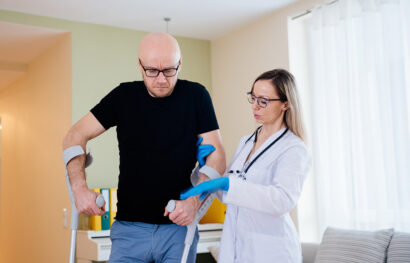 Physical therapy plays a significant role in helping you recover from conditions and injuries. It uses a broad range of techniques to relieve pain, restore function, and promote healing. If you sustain an injury or are recovering from surgery, your physical therapist will work with you to design a personalized treatment plan.
Physical therapy plays a significant role in helping you recover from conditions and injuries. It uses a broad range of techniques to relieve pain, restore function, and promote healing. If you sustain an injury or are recovering from surgery, your physical therapist will work with you to design a personalized treatment plan.
Physical Therapy Treatments
Here are some treatment methods that physical therapists use:
- Customized exercise plans
- Manual hands-on therapy
- Heat and cold therapies
- Assistive or corrective durable medical equipment
Physical therapy is appropriate for new and old injuries, as well as acute and chronic conditions. Let’s go through some situations where a physical therapist can help you.
Sports Injuries
You may damage your musculoskeletal system if you push your body too hard or experience a sudden impact while playing a sport. The musculoskeletal system consists of bones, muscles, and connective tissues.
Sprains and strains are common sports injuries. Depending on the location and severity of the injury, you may have to work with a physical therapist to speed up healing and restore the damaged musculoskeletal structures. Here are some sports injuries where physical therapy can help:
- ACL tear
- Elbow pain and injuries
- Foot pain
- Hip pain
- Joint injuries
- Knee pain
- Meniscus tear
- Plantar fasciitis
- Shoulder pain
- Soft tissue tears
- Spine and neck injuries
- Tendonitis
- Wrist or hand pain
Neurological Disorders
Your nervous system is a complex system that delivers signals from your brain to the rest of your body. Neurological disorders can affect your ability to do daily physical activities, affecting your quality of life. Some nervous system conditions can also affect the musculoskeletal system. Some conditions that could benefit from physical therapy include:
- Stroke
- Cerebral palsy
- Spine and neck injuries
- Parkinson’s disease
- Guillain-Barre Syndrome
With the help of physical therapy, you’re more likely to recover and improve your strength and range of motion. Additionally, physical therapy can also help restore functionality to body parts that may have been affected by a disease. The ultimate goal of neurological physical therapy is to make the patient self-sufficient to perform most day-to-day activities.
Degenerative Conditions
One of the most common degenerative conditions is arthritis. Arthritis refers to a condition where the structures in joints deteriorate over time, causing joint pain, stiffness, tenderness, and swelling. Unfortunately, there is no cure for arthritis. Treatments focus on addressing the painful symptoms and slowing down the progression of the disease.
Physical therapy is a vital component of arthritis treatment. Your provider may recommend assistive devices to provide joint pain relief. More importantly, they can craft a personalized exercise plan to reduce painful symptoms. Exercise is one of the most effective methods to relieve pain. Regular physical activity can release hormones known as endorphins, your body’s natural painkillers.
Post-Surgical Rehabilitation
In some cases, undergoing physical therapy may delay surgery. However, your doctor may recommend surgery if your condition no longer responds to conservative treatments. For instance, severe arthritis may warrant joint replacement surgery. After surgery, physical therapy will play a vital role in your rehabilitation.
Your physical therapist will help you get used to your new joint and reap the benefits of the surgery. They can also suggest some exercise routines to help you regain your strength as soon as possible.
Expert Physical Therapist Blue Springs, MO
Physical therapy is a critical component of most stages of recovery, whether as a restorative or preventive treatment. Depending on their specialty, a physical therapist could help you speed up healing from a wide range of diseases and sports injuries.
Do you need pain relief, or are looking for the best way to recover after surgery? If you’ve been searching for a physical therapist in Blue Springs, look no further than Core Medical Center. Our highly-trained staff can support you throughout every stage of the recovery process. We take pride in our skills and experience and can help you get back on your feet.
To schedule an appointment, you may contact us at (816) 427-0201 or use this online appointment request form. We look forward to serving you.




